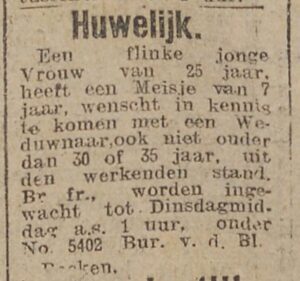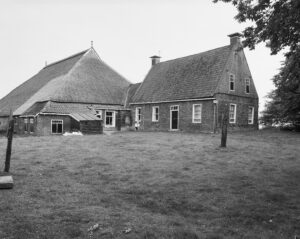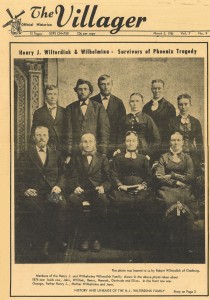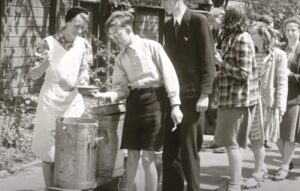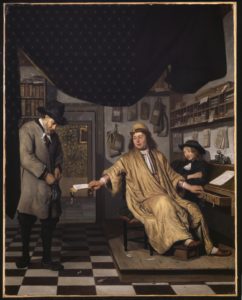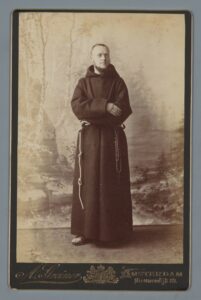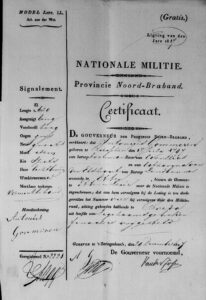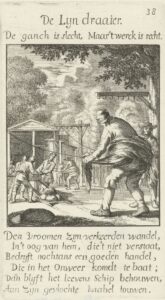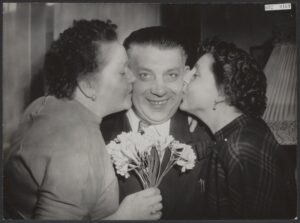A contactadvertentie is a contact ad, an advertisement by a person looking for a spouse. The ads are almost always anonymous, but give you some idea what people found important in a spouse. Example This ad from the Rotterdamsch Nieuwsblad [Rotterdam Newspaper] of 14 January 1913 shows one woman using an ad to find a spouse. Marriage A capable young woman age 25, with a girl age 7, wishes to make her acquaintance with a widower, no older than 30 or 35, from the working class. Letters … [Read more...]
Dutch term – Kop-hals-rompboerderij
A kop-hals-rompboerderij (literally: head-neck-torso farm) is a type of farm. The living area formed the head of the farm, where the farmer's family would have lived. A narrow corridor (the neck), sometimes with bedsteads for staff, connected the living area to the stables where the animals were housed (the torso). It is a type of farm mainly found in the northern provinces of Friesland and Groningen. … [Read more...]
Dutch term – Broer, broeder
A broer or broeder (old spelling) is a brother. A half-brother is a halfbroer or broeder van halven bedde (brother of half a bed; old term). See the chart for other Dutch terms for relationships. … [Read more...]
Dutch term – Royement
A royement can have multiple meanings, all having to do with cancellation or ceasing to be valid. When referring to persons, it is a disbarment or revoking of membership. When referring to records, it means the record itself is cancelled, for example when a mortgage is paid. You may come across the term in contemporary summaries of notarial records. Royementen of mortgages were typically created and handed to the interested party, rather than also being copied into the notaries' minutes. The … [Read more...]
Dutch term – Monnik
A monnik is a monk. Monniken are mostly found in the Roman-Catholic parts of the Netherlands like Noord-Brabant or Limburg. Before the Reformation, they were found all over the country. In the Middle Ages, many cities had monasteries where monks lived. In some towns, the monasteries disappeared but the name can still be found in street names or field names. Nowadays, few men become monks, even among Roman-Catholics. … [Read more...]
Dutch term – Vrijstelling
A vrijstelling is an exemption. You may come across the term in military enlistment registers or marriage supplements, if a person was vrijgesteld [exempted] from military service. Example: Antonie Gommeren's military exemption When Antonie Gommeren married Adriana Timmermans in Etten-Leur on 27 January 1828, he had to prove he had fulfilled his military duties. He submitted a certificate of National Militia that included the text "uit hoofde van ligchaamsgebreken finaal vrijgesteld" [received … [Read more...]
Dutch terms for different prisons
Before 1811, locking people up was typically not used as a punishment. People could be confined while awaiting trial, or could be committed to a tuchthuis (house of discipline) where they had to do hard labor. In 1811, the French prison model was introduced, where people would be locked up in a gevangenis [prison]. The system was overhauled in 1821 and again in 1886. Here is an overview of the different terms and meanings. For more information about researching prisoners, see the articles … [Read more...]
Dutch term – Touwslager or lijndraaier
A touwslager or lijndraaier is a rope maker. The occupation can be found in many places, especially near harbors. Ropes for rigging were made in a lijnbaan, a ropeway to create long ropes. … [Read more...]
Dutch term – Zoen
In modern Dutch, a zoen is a kiss. Before say 1650, however, it was a legal term for a reconciliation. For example, if somebody was murdered, the family of the victim and the murderer could get together to see if they could come to an agreement. The agreement could have included payment of a compensation, banishment of the murderer, asking forgiveness in church, doing penitence, et cetera. If the families came to an agreement, there would be no criminal prosecution. For an example of such an … [Read more...]
